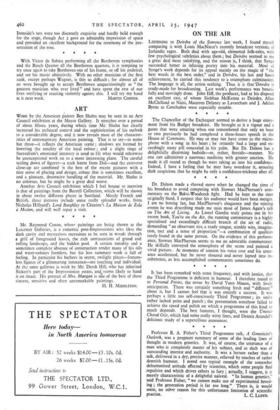ON THE AIR
LISTENING to Deirdre of the Sorrows last week, I found myself comparing it with Louis MacNiece's recently broadcast versions of Icelandic sagas. Both deal with age-old, elemental folk-tales, with few psychological subtleties about them ; but Deirdre seemed to me a great deal more satisfying, and the reason is, I think, that Synge succeeded better in infusing poetry into his material. Most of Synge's work depends for its appeal mainly on the magic of "the best words in the best order," and in Deirdre, his last and finest achievement, he carried this tendency to a triumphant culmination. The language is all, the action nothing. Thus it is that'Deirdre is ready-made for broadcasting. Last week's performance was beauti- fully and movingly done. John Iliff, the producer, had at his disposal an excellent cast, of whom Siobhan McKenna as Deirdre, Allan McClelland as Naisi, Maureen Delaney as Lavarcham and J. Adrian Byrne as Conchubor were especially notable.
*
The Chancellor of the Exchequer seemed to derive a huge enjoy- ment from' his Budget broadcast. He brought to it a vigour and a gusto that were amazing when one remembered that only an hour or two previously he had completed a three-hours speech in the House of Commons. He may or may not have come to the micro- phone with a song in his heart ; he certainly had a large and ex- ceedingly nasty pill concealed in his palm. But Dr. Dalton has a delightfully disarming bedside—or, rather, fireside—manner. No one can administer a nauseous medicine with greater unction. He made it all sound as though he. were taking us into his confidence. Indeed, I have a feeling that he may have overdone it, arousing dark suspicions that he might be only a confidence-trickster after all.
* * * *
Dr. Dalton made a shrewd move when he changed the time of his broadcast to avoid competing with Stewart MacPherson's com- mentary on the Baksi-Woodcock fight. Had he kept to the time originally fixed, I suspect that his audience would have been meagre. I am no boxing fan, but MacPherson's eloquence and the stirring events he was describing made me miss most of James Agate's talk on The Art of Living. As Lionel Gamlin truly points out in his recent book, You're on the Air, the running commentary is a highly specialised and exceedingly difficult branch of the art of radio, demanding " an observant eye, a ready tongue, nimble wits, imagina- tion, tact and a sense of proportion "—a combination of qualities rarely found in the same person. On the evidence of this perform- ance, Stewart MacPherson seems to me an admirable commentator. He skilfully conveyed the atmosphere of the scene and painted a vivid picture.. At moments of tension his voice rose and his utter- ance accelerated, but he never shouted and never lapsed into in- coherence, as less accomplished commentators sometimes do.
It has been remarked with some frequency, and with justice, that the Third Programme is deficient in humour. I therefore tuned in to Personal Points, the revue by David Yates Mason, with lively anticipation. There was certainly something fresh and "different" about it, but I cannot feel that it was entirely a success. It was perhaps a little too self-consciously Third Programme ; its satire rather lacked point and punch ; the presentation somehow failed to achieve the speed and polish on which a programme of this kind so much depends. The best features, I thought, were the Unesco Choral Odie, which had some really witty lines, and Dennis Arundel's delicious study of a supercilious announcer.
* *
Professor R. A. Fisher's Third Programme talk, A Geneticist's Outlook, was a pregnant summary of some of the leading lines of thought in modern genetics. It was, of course, the utterance of a man who is completely master of his subject, and as such was of outstanding interest and authority. It was a lecture rather than a talk, delivered in a dry, precise manner, relieved by touches of rather donnish humour. I noted one typical example of the somewhat dehumanised attitude affected by scientists, which some people find -repulsive and which drives others to fury ; actually, I suggest, it is merely characteristic of a delightful naivete. " In human genetics," said Professor Fisher, " we cannot make use of experimental ,breed- ing ; the generation period is far too long." There is, it would seem, no other reason for this unfortunate limitation of scientific


































 Previous page
Previous page